Spin Studio Maven Ruth Zukerman Isn’t Afraid to be Vulnerable
November 30, 2018 | Filed in: Woman of the Week
When Ruth Zukerman graduated from college in 1980, she moved to New York with big plans to become a professional dancer. But after years of auditions, she got married and became a mom instead, teaching dance classes on the side. When her marriage ended and she had to find a way to support herself and her twin daughters, she began teaching spin classes and eventually co-founded SoulCycle, the indoor cycling juggernaut. Her partnership with the other two co-founders ended suddenly, however, and she found herself on her own again—until she was approached by two venture capitalists to start another spin studio in 2010, which became Flywheel Sports. Now, as Flywheel’s creative director, Ruth still teaches five cycling classes a week, and has written a memoir about her experiences in and out of the studio, Riding High: How I Kissed SoulCycle Goodbye, Co-Founded Flywheel, and Built the Life I Always Wanted. Here, she discusses the importance of vulnerability, and shares how years of therapy helped her become the businesswoman she is today.
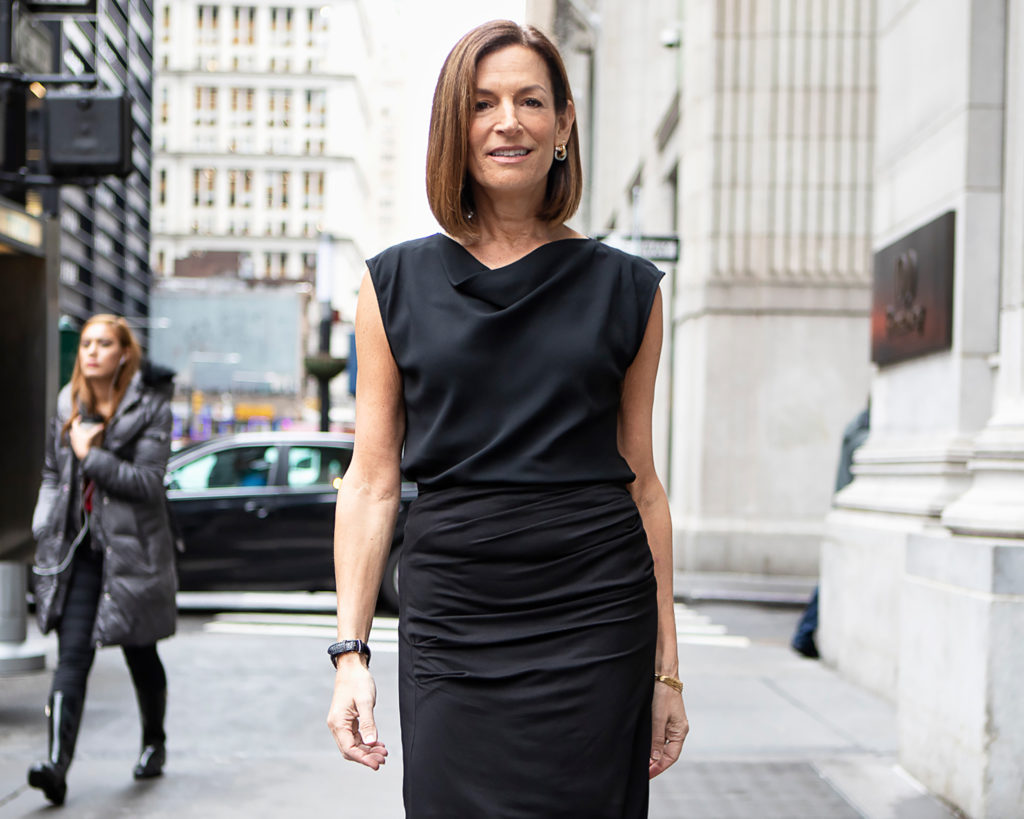
Ruth wears the Rowling top, Soho skirt, and Roberta earrings.
ALMOST ALL OF MY BUSINESS KNOWLEDGE was learned on the job, but some of it was instinctual as well. When we started Flywheel, my co-founders came from a private equity background, which I knew nothing about. The three of us stayed in our own lanes, for the most part, which speaks to the success of the partnership; we each did what we did well. As an instructor, and as I took ownership of everything creative that went on within the studio walls, I ran my part of the business from a place of warmth and empathy. From the beginning, I put a lot of emphasis on listening to employees, hearing how they were doing, commending them when they did a great job, and nurturing them. A big piece of my background was being a mother, and a lot of those maternal qualities are what helped me to become a successful leader.
I’VE ALWAYS BEEN A GOOD LISTENER, and people feel comfortable talking to me. My mother was a psychotherapist, and I think that influenced me. But I didn’t know that my ability to connect with people was such a strength until I started teaching spin classes. Once I saw the physical and emotional effect that these classes could have on people, I was able to use the bike and the experience in the studio to create deep connections.
I USE CLASS AS AN OPPORTUNITY to talk about various challenges that I’m experiencing in my life. I know they’re not uncommon, and they resonate with a lot of people. Typically, at the end of a class, riders will approach me and say, “Oh, my god. I felt like you were speaking directly to me.” I want people to know that they’re not alone in the problems they go through. It’s the moments when we make ourselves vulnerable that people really connect.
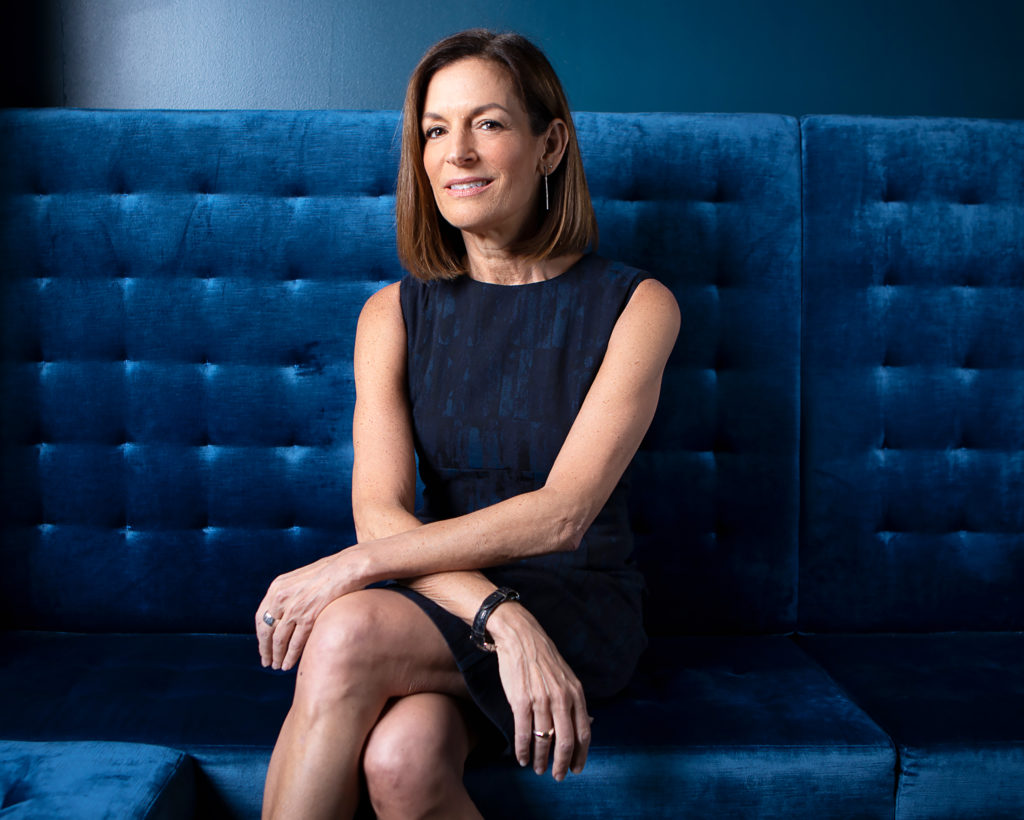
Ruth wears the Shirley dress and Williamina earrings.
AFTER FLYWHEEL BECAME SUCCESSFUL, a lot of people started telling me I should write a book—mostly riders or friends. I would say, “Oh, that’s really kind of you. Thanks.” And I would never think twice about it. Then one day, I met someone who is now a very close friend, a well-known artist. He invited me to his studio and said he wanted to know my story, and I told him. And he said, “You know, you really need to write a book.” And I said the same thing as usual: “Oh, thank you.” And he said, “No, no, you really do. In fact, I’m going to introduce you to a literary agent.” And he did. I thought, What do I have to lose? The agent invited me to his apartment—he and his wife are a team—and I told them my story. Before I got home, I had a contract in my inbox.
WRITING A BOOK WAS NOT THAT DIFFICULT FOR ME. I had a collaborator who helped me with organization, getting started, knowing which anecdotes were important and which weren’t. Once I had those guidelines, I just sat down and it flowed. I wrote the whole book in one summer. I love to write, and I found it cathartic to go back and revisit some of the difficult moments in my life. The hardest part for me came later—realizing that the the book was written, and now I had to put it out there and share a very personal story with a lot of people.
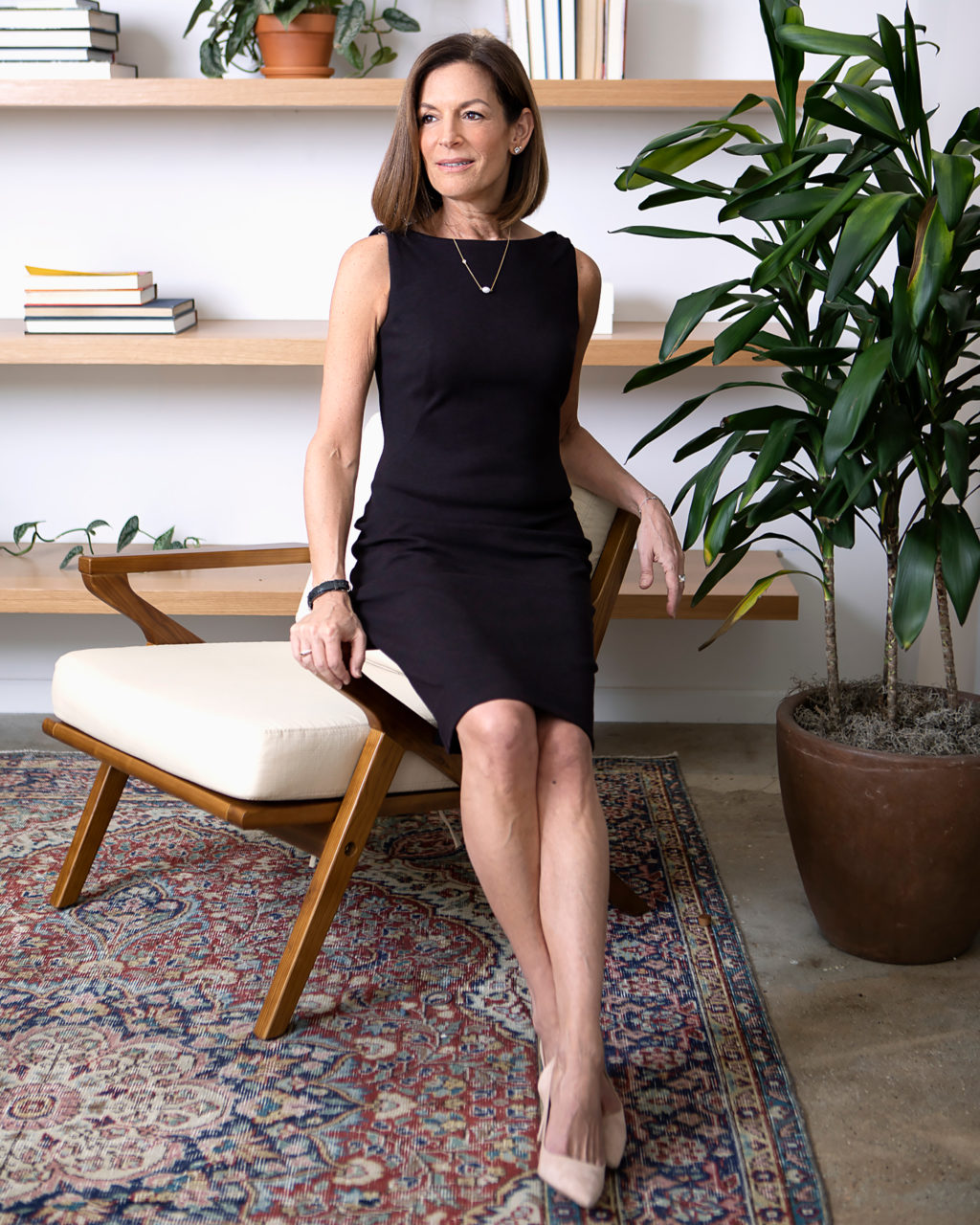
Ruth wears the Lydia dress and Vivara necklace.
I GREW UP IN A HOME WHERE IT WAS HARD to find my voice. I had a very strong, domineering mother whose opinions were more important than mine. As a result, I was pretty shy and quiet. Through years of therapy, I was able to find myself, and ultimately like myself. If I hadn’t gone through that sometimes arduous process, the book probably would not have been possible.
MY CURRENT THERAPIST IS MY THIRD. I was 32 when I started therapy, and I’m 60 now, so it’s been 28 years. All three therapists have been very different, and the times I’ve switched are when I felt like I was no longer making progress in a particular area. The key to succeeding in therapy, and growing and building strength, is your willingness to open yourself up. Of course, we all come across people who have been in therapy for years and you think, Wow, I’m surprised that person has not come further. But it’s not always the therapist’s fault; it’s how willing the patient is to participate.
I LOVE THAT PEOPLE ARE COMFORTABLE telling me personal things about themselves, but it can be draining. Sometimes people line up after class to talk to me, and I’m 100 percent there when that happens. I wouldn’t do it if I didn’t love it. I didn’t go into this business just to make money. Obviously I needed to support myself, and yes, I love being able to buy things that I want. But I chose this particular business because I find the work incredibly gratifying. In order to manage it, though, I spend a significant amount of time on my own. I’m absolutely fine staying at home for a weekend watching Netflix.
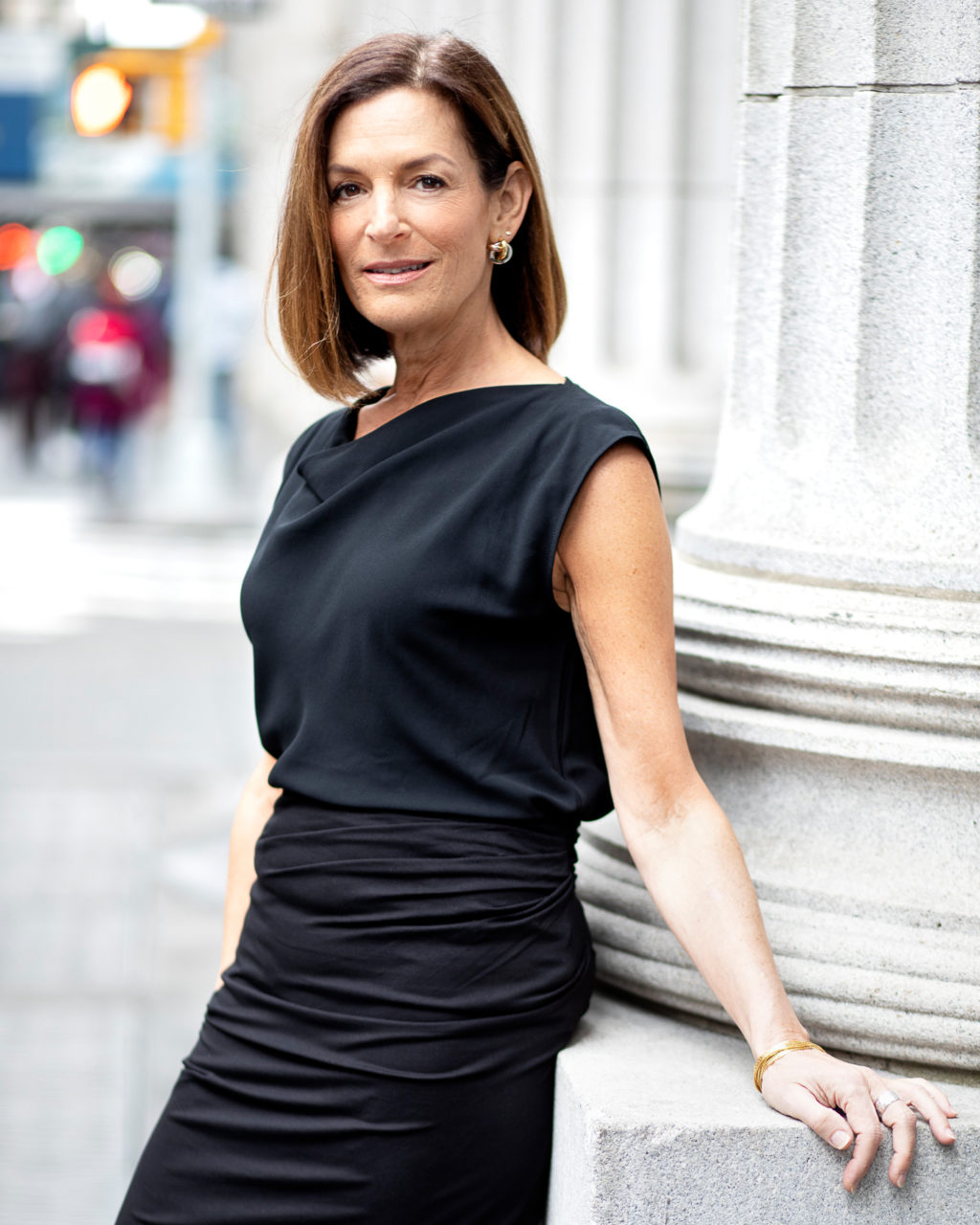
Ruth wears the Rowling top, Soho skirt, and Roberta earrings.
AS A DANCER, I WAS TRAINED TO AVOID INJURY and take care of myself so that I didn’t burn out. But when we started SoulCycle, we didn’t have many instructors, and I was teaching about 20 to 22 classes a week. During that period, each time I would get on the bike to teach, I would think, How am I going to get through this? And then the playlist would start, and the exhaustion would all just fall away. But it was cumulative, and when I was off the bike, I was spent. I spent a lot of time in the bathtub, getting massages, and sleeping at home whenever I could. I would take naps in the afternoon between classes. I had no social life, because I also had two high-school aged daughters, and I needed enough energy to be with them, too.
PEOPLE ALWAYS ASK ME ABOUT BALANCE, and when you’re a mother starting a business, it’s extremely tough. My temper ran short sometimes. There was a moment when I was driving my daughter to college, and we got lost, and I completely fell apart and had to pull over crying. With Flywheel it was different, though, because we had more instructors in the beginning, so the ramp-up wasn’t quite as acute as it had been with SoulCycle.
TODAY, I TYPICALLY TEACH ABOUT FIVE CLASSES A WEEK, and it’s just right. Do I get tired now that I’m 60? Yes. But it’s still such an important part of my day—and it’s important for my own psyche, both in terms of what I can give to riders in my class, but also in terms of my own need to manage potential depression and anxiety. At this point, my body is dependent on those endorphins.
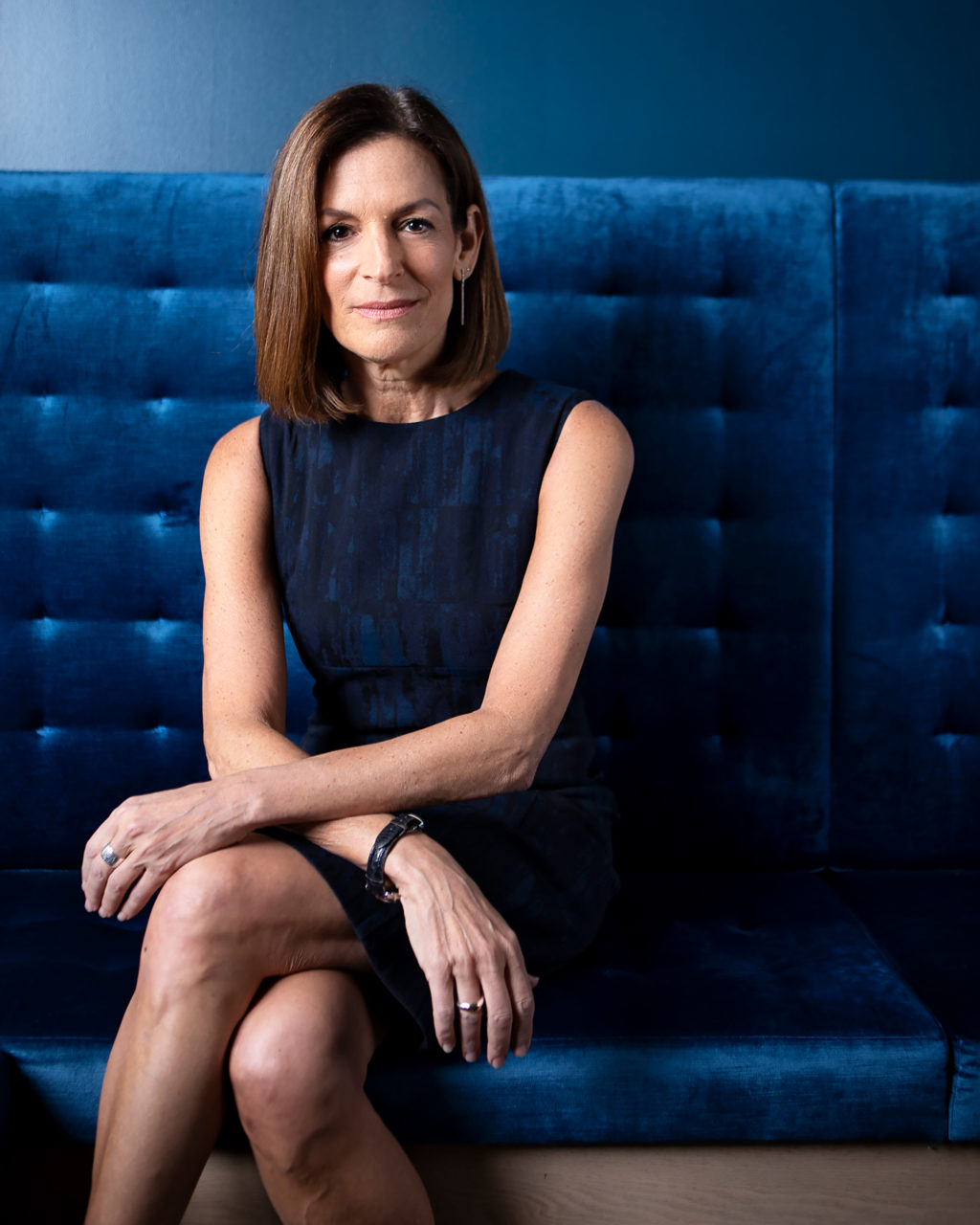
Ruth wears the Shirley dress and Williamina earrings.
WHEN I WAS GOING THROUGH MENOPAUSE, I put on a good 10 pounds. For about two years, when I was in the thick of it, the weight was completely uncontrollable. It didn’t matter how little I ate; it would not come off. But I processed this change with therapy, and I’ve learned how to accept myself no matter what I look like. I’ve also made a conscious decision to not have anything done—no Botox or anything like that. I might change my mind at some point; every morning when I look in my magnifying mirror, it’s not fun. I’ve been much older than most of the other Flywheel instructors for a while now. But I’m also comfortable with who I am and what I’ve been through.
THE MOMENT WHEN I REALLY FELT SUCCESSFUL was after Flywheel had taken off. We had a lot of people coming in, and we were getting good press and great overall feedback. But to a certain degree, I was still fixating on what had happened at SoulCycle and the failure of the partnership. And one of my partners said, “You know what, Ruth? Instead of dwelling on the negative things that happened at SoulCycle, why don’t you turn it around and think about the fact that you’ve now started not just one successful business, but two?” And that was it. There was something about that moment where I was able to move away from the negativity that I’d experienced and embrace that achievement. It took a long time for me to be able to do that. And it feels amazing.
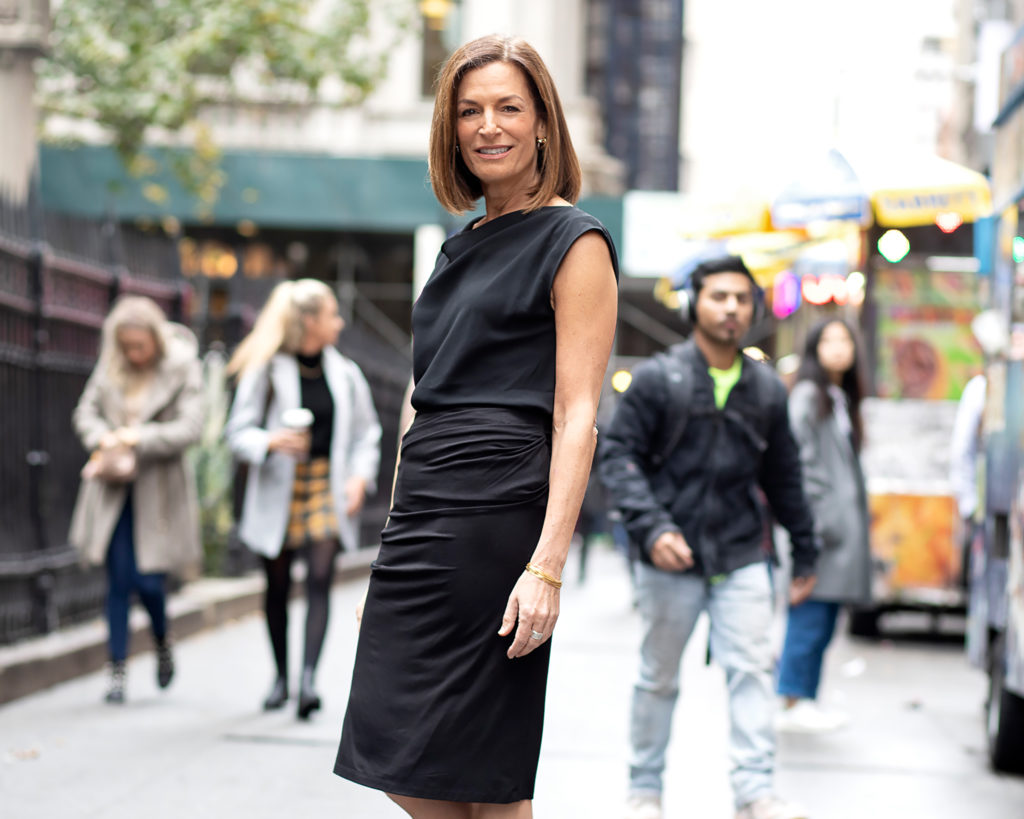
Ruth wears the Rowling top, Soho skirt, and Roberta earrings.
Photographs by Sarah Kerens. Styling by Shanna Engelhardt.





